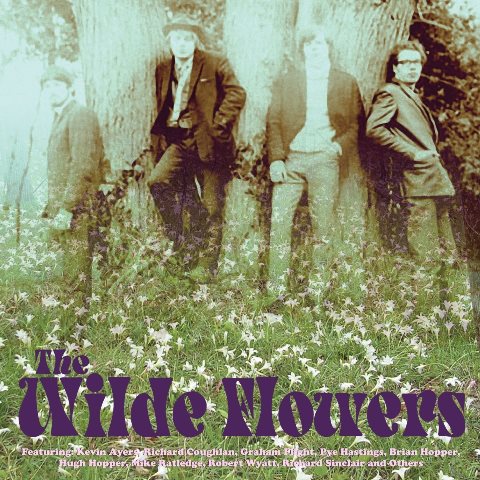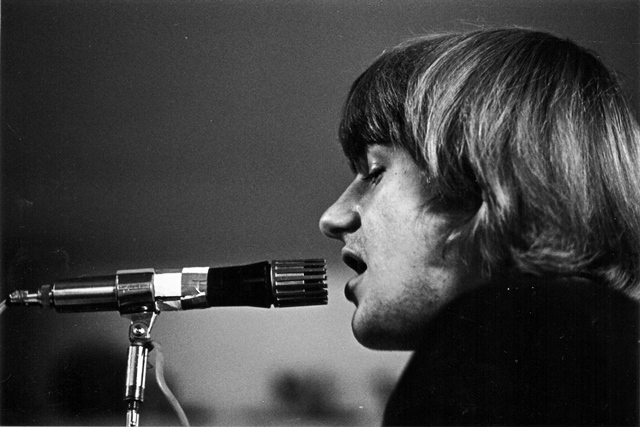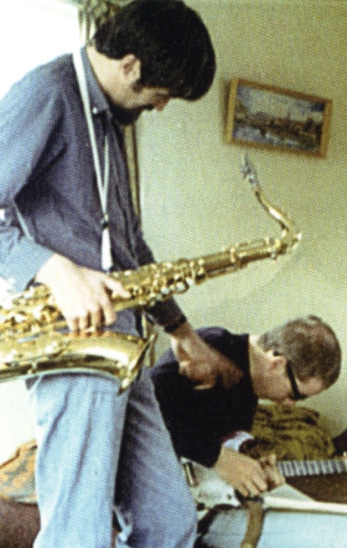Though Soft Machine were the first band to suggest Canterbury could be musically noteworthy, the appearance of Caravan’s debut album in late 1968, Kevin Ayers' post-Soft Machine solo outing two years later, and the subsequent arrivals of Gong, Matching Mole, Hatfield & the North and the solo Robert Wyatt confirmed the city had a fertile scene. It was a fluid environment where musicians from one band played with others. The mutability was captured in one of the most entangled of Pete Frame’s celebrated Rock Family Trees.
And at its top: The Wilde Flowers. The band formed in 1963 and featured future members of both Soft Machine and Caravan. Kevin Ayers, Hugh Hopper and Robert Wyatt went on to the former, Richard Coughlan, Pye Hastings and Richard Sinclair to the latter. They weren’t all in The Wilde Flowers at the same time as each other, but the band was the hothouse enabling them to refine their visions and pursue future paths.
 The confusing story did not become less so once Soft Machine and Caravan were off the ground. This new double-CD collection, The Wilde Flowers, includes four tracks recorded in August 1969 by a version of the band featuring the-then Caravan member Hastings, Hugh Hopper and Wyatt (both in Soft Machine), and Mike Ratledge (who had not been in The Wilde Flowers, but was in Soft Machine). These also feature Brian Hopper, who had been in The Wilde Flowers from day one, but did not go on to either Caravan of Soft Machine. The boundaries between The Wilde Flowers, Soft Machine and Caravan were often unclear.
The confusing story did not become less so once Soft Machine and Caravan were off the ground. This new double-CD collection, The Wilde Flowers, includes four tracks recorded in August 1969 by a version of the band featuring the-then Caravan member Hastings, Hugh Hopper and Wyatt (both in Soft Machine), and Mike Ratledge (who had not been in The Wilde Flowers, but was in Soft Machine). These also feature Brian Hopper, who had been in The Wilde Flowers from day one, but did not go on to either Caravan of Soft Machine. The boundaries between The Wilde Flowers, Soft Machine and Caravan were often unclear.
With their make-up, The Wilde Flowers were obviously significant. Although nothing was released during their lifetime, archive material has been issued before. With its 33 tracks, The Wilde Flowers is their most exhaustive release to date and – happily – is well-worth hearing. Anyone curious about the evolution of the jazz-inclined side of British psychedelia will need this.
Disc One collects the August 1969 sessions, two demo outings in a Kent studio from March 1965 and Spring 1966, as well as some home recordings from 1965 and 1966. There are also three tracks by Brian Hopper’s 1968 band Zobe. Disc Two has a couple of Brian Hopper/Wyatt tracks from 2003, nine home recordings from 1962 to 1964 with various permutations of Brian and Hugh Hopper, Ratledge and Wyatt. There is also one track by a nascent Caravan which had Brian Hopper on board. The track listing is as confusing as the family tree and made more so by not being sequenced chronologically. The photo-peppered booklet includes a lengthy essay by Brian Hopper. This is as definitive a musical statement on the ever-fluid Wilde Flowers as it will get.
 Despite recording pretty awful, weedy versions of the crowd-pleasing blues work-outs “Parchman Farm” and “Almost Grown” in 1965, The Wilde Flowers were really about bolting an interest in jazz to then-current forms of pop. The rock-style tracks they taped are unconvincing and, equally, they don’t sound convinced with what they were doing. The band was on firmer ground tackling original material. (Pictured left, Robert Wyatt live with The Wilde Flowers in 1965.)
Despite recording pretty awful, weedy versions of the crowd-pleasing blues work-outs “Parchman Farm” and “Almost Grown” in 1965, The Wilde Flowers were really about bolting an interest in jazz to then-current forms of pop. The rock-style tracks they taped are unconvincing and, equally, they don’t sound convinced with what they were doing. The band was on firmer ground tackling original material. (Pictured left, Robert Wyatt live with The Wilde Flowers in 1965.)
In his liner notes, Brian Hopper name-checks John Coltrane, Miles Davis, Bill Evans, Charles Mingus, Charlie Parker and Cecil Taylor as amongst the band member's inspirations. But he also notes that they were keenly aware of the landscape of popular music. He had been to the 2i’s coffee bar in Soho and knew – early on – that rock ‘n’ roll was where it was it. The Shadows were an influence. So, later, were hard-edged, mod-rock band The Birds. Nonetheless, jazz was in the blood and Brian Hopper bought an alto sax.
 The result was a band which sometimes uncomfortably balanced the populist with jazz. While audiences could see The Wilde Flowers perform Chuck Berry songs, they would also be tested by live sets which linked all their compositions together in a single, free-flowing whole with bridging music. The eccentric, tentative, home-recorded compositions on Disc Two hint at the nature of these early experiments. (Pictured right, Brian and Hugh Hopper rehearsing in 1964.)
The result was a band which sometimes uncomfortably balanced the populist with jazz. While audiences could see The Wilde Flowers perform Chuck Berry songs, they would also be tested by live sets which linked all their compositions together in a single, free-flowing whole with bridging music. The eccentric, tentative, home-recorded compositions on Disc Two hint at the nature of these early experiments. (Pictured right, Brian and Hugh Hopper rehearsing in 1964.)
Although the source of Caravan too, The Wilde Flowers most evoke Soft Machine and the solo Robert Wyatt. Fans will want the prototype versions of "Memories", later recorded by Wyatt as a B-side, while some of the band’s songs (not recorded, so not included here) were reconfigured for Soft Machine's second album.
Amongst the gems is the fantastic “Never Leave Me”, recorded in early 1966. Sharing the wandering, multi-chordal characteristic of early Soft Machine songs it also – in its punky crudeness – has the feel of the earliest recordings by the wayward Los Angeles bands The Mothers of Invention and The West Coast Pop Art Experimental Band. “Time After Time”, from the same session, borrows the riff from “Heatwave” but also shares this surprising Californian atmosphere. Best of all are the modal-based “No Game When You Lose” and “Impotence”, with its ominous descending melody. All four songs were written by Hugh Hopper and sung by Wyatt.
The Wilde Flowers is as complex and inconsistent as the story of the band itself, and those which followed in its wake. Nonetheless, the effort to disentangle what it represents is worth making as, in forthright terms, it confirms that Soft Machine were the continuation of a work in progress.















Add comment